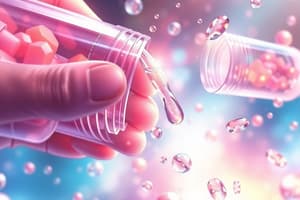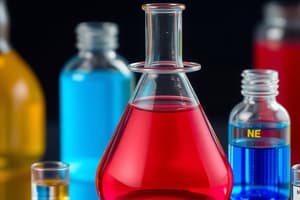Podcast
Questions and Answers
What is a solution?
What is a solution?
A homogeneous mixture of two or more components.
What is the component that determines the phase of the solution called?
What is the component that determines the phase of the solution called?
Solvent
Which of the following types of mixtures are of interest in Pharmacy?
Which of the following types of mixtures are of interest in Pharmacy?
- Gaseous solute in liquid solvent (correct)
- Solid solute in gas solvent
- Gas solute in solid solvent
- Liquid solute in liquid solvent (correct)
Which of the following is NOT a classification of pharmaceutical solutions based on their mode of application?
Which of the following is NOT a classification of pharmaceutical solutions based on their mode of application?
What are syrups?
What are syrups?
What is the primary purpose of elixirs?
What is the primary purpose of elixirs?
What type of solutions are tinctures?
What type of solutions are tinctures?
What is the primary requirement for parenteral solutions?
What is the primary requirement for parenteral solutions?
Oral solutions are administered in solid dosage form.
Oral solutions are administered in solid dosage form.
What factors must be considered when formulating a pharmaceutical solution?
What factors must be considered when formulating a pharmaceutical solution?
Flashcards are hidden until you start studying
Study Notes
Solutions
- Defined as a homogeneous mixture of two or more components.
- The solvent determines the phase of the solution while solutes are dispersed particles.
- Solutions can consist of any combination of solid, liquid, or gas.
- Nine possible types of homogeneous mixtures based on states of matter exist.
Pharmaceutical Solutions
- Pharmaceutical solutions are liquid preparations containing dissolved chemical substances.
- Classifications based on application include oral, otic, ophthalmic, and topical solutions.
- Types of pharmaceutical solutions:
- Syrups: Aqueous solutions with sugar.
- Elixirs: Sweetened hydroalcoholic solutions.
- Spirits: Solutions of aromatic materials with alcoholic solvents.
- Aromatic Waters: Solutions of aromatic materials with aqueous solvents.
- Tinctures: Solutions extracting active constituents from crude drugs or dissolved chemical substances.
- Parenteral Solutions: Sterile solutions intended for injections or infusions.
Oral Solutions
- Comprise syrups, elixirs, spirits, and tinctures aiming for systemic drug effects.
- Administered in solution form for faster absorption compared to solid dosage forms.
- Often contain additional solutes for color, flavor, taste, or stability.
- Pharmacists must understand solubility and stability of each solute in relation to the solvent.
- Avoid chemical or physical interactions that affect product quality.
- Familiarity with solubility characteristics is crucial for successful formulation.
- Solubility information is typically found in pharmacopoeias like the United States Pharmacopeia.
Key Concepts Related to Solubility
- Factors affecting solubility include temperature, pressure, and the nature of solute and solvent.
- The mechanism of dissolution involves breaking solute-solute interactions and forming solvent-solute interactions.
- Colligative properties like boiling point elevation, freezing point depression, and vapor pressure lowering are relevant in drug formulation and stability.
Application and Problem Solving
- Knowledge of solutions, solubility, and phase equilibria is essential for addressing practical pharmaceutical problems.
Studying That Suits You
Use AI to generate personalized quizzes and flashcards to suit your learning preferences.




